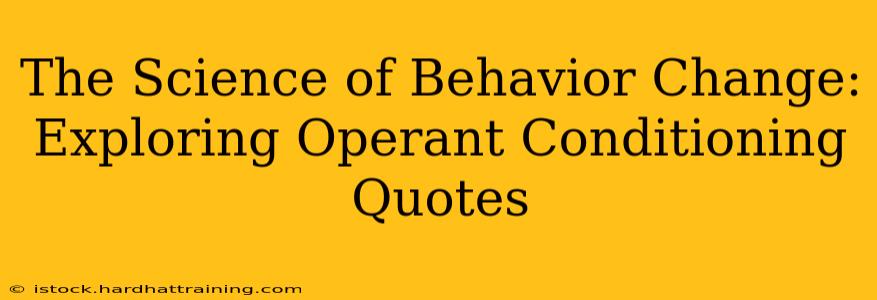Operant conditioning, a cornerstone of behavioral psychology, explains how we learn through consequences. Understanding its principles can significantly improve our lives, from personal habits to workplace productivity. This exploration delves into the science behind operant conditioning, illustrated through insightful quotes that illuminate its power and application. We'll also address some frequently asked questions surrounding this influential learning theory.
What is Operant Conditioning?
Operant conditioning, primarily developed by B.F. Skinner, posits that behaviors are learned and strengthened through reinforcement (increasing the likelihood of a behavior) and weakened through punishment (decreasing the likelihood of a behavior). It's a powerful tool for understanding how we acquire and modify our actions, shaping everything from simple reflexes to complex social behaviors. This contrasts with classical conditioning, which focuses on associating stimuli. In operant conditioning, the focus is on the consequences of behavior.
Key Concepts in Operant Conditioning
Before we delve into quotes, let's briefly review the core components:
- Reinforcement: Increases the likelihood of a behavior being repeated. This can be positive reinforcement (adding something desirable, like a reward) or negative reinforcement (removing something undesirable, like a chore).
- Punishment: Decreases the likelihood of a behavior being repeated. This can be positive punishment (adding something undesirable, like a reprimand) or negative punishment (removing something desirable, like privileges).
- Extinction: The gradual weakening and eventual disappearance of a learned response when reinforcement is stopped.
- Shaping: Reinforcing successive approximations of a desired behavior. This is particularly useful for teaching complex behaviors.
Exploring Insightful Quotes on Operant Conditioning
Many prominent figures have offered insightful perspectives on operant conditioning, highlighting its implications for various aspects of life. Let's examine a few:
"Behavior is a function of its consequences." - B.F. Skinner. This concise statement encapsulates the core principle of operant conditioning. Our actions are shaped by what happens after we perform them.
"The great majority of human behavior is learned." – B.F. Skinner. This quote emphasizes the significant role learning plays in shaping our actions, highlighting the importance of understanding operant conditioning principles.
While many quotes directly from Skinner explain the mechanics of the theory, the true impact lies in applying its principles.
How Can I Use Operant Conditioning in My Daily Life?
Operant conditioning isn't just an academic concept; it's a practical tool. You can apply its principles to improve various aspects of your life:
- Habit Formation: Reward yourself for engaging in positive behaviors (e.g., exercising) and reduce rewards for negative ones (e.g., mindless snacking).
- Child Rearing: Positive reinforcement is far more effective than punishment in shaping children's behavior. Reward good behavior and ignore minor misbehavior.
- Pet Training: Operant conditioning is the foundation of effective pet training. Positive reinforcement techniques, such as treats and praise, work better than punishment.
- Workplace Productivity: Implementing reward systems and positive feedback can significantly boost employee morale and productivity.
What are the Limitations of Operant Conditioning?
While powerful, operant conditioning has limitations:
- Ethical Considerations: Punishment can have negative side effects, including aggression and anxiety. Positive reinforcement is generally preferred.
- Complexity of Human Behavior: Human behavior is rarely determined by simple stimulus-response patterns. Cognitive factors and emotions play significant roles.
- Individual Differences: What reinforces one person may not reinforce another.
What is the Difference Between Operant and Classical Conditioning?
This is a common point of confusion. Classical conditioning involves learning through association, pairing a neutral stimulus with a naturally occurring stimulus to elicit a response (Pavlov's dogs). Operant conditioning involves learning through consequences, where behavior is shaped by reinforcement and punishment.
How Does Operant Conditioning Relate to Reinforcement Schedules?
Reinforcement schedules dictate when reinforcement is delivered. Different schedules (fixed-ratio, variable-ratio, fixed-interval, variable-interval) lead to different patterns of responding. Understanding these schedules is crucial for effective application of operant conditioning.
Conclusion: The Enduring Power of Operant Conditioning
Operant conditioning remains a vital framework for understanding behavior change. By applying its principles thoughtfully and ethically, we can effectively shape our actions, improve our habits, and achieve our goals. Remember that positive reinforcement is usually the most effective and humane approach. Understanding the nuances of reinforcement schedules further refines the process. Through conscious application and a deep understanding of its implications, operant conditioning empowers us to navigate and shape our world.
